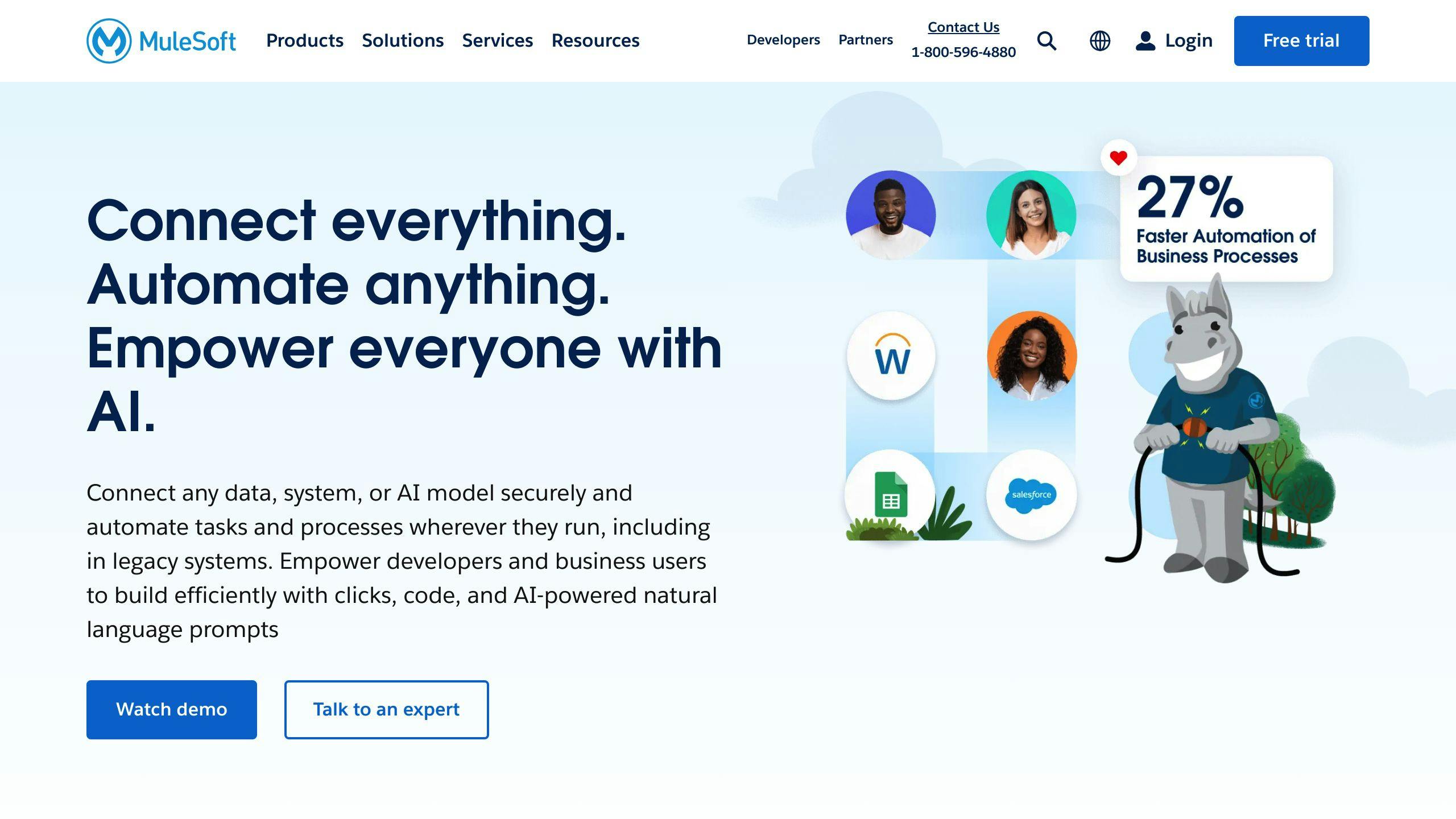Boomi Integration is a user-friendly platform that connects various business systems. Here's a quick overview:
- Used by 20,000+ companies worldwide
- Known for ease of use and low-code approach
- Connects apps, databases, and APIs
- Suitable for small to medium businesses
Quick Comparison:
| Feature | Boomi | MuleSoft | Informatica |
|---|---|---|---|
| Ease of use | Easy | Technical | Moderate |
| Main strength | User-friendly | Powerful features | Data management |
| Best for | SMBs | Large enterprises | Data-heavy industries |
| Integration focus | Cloud-based | API-led | Data integration |
| Cost | Flexible, cost-effective | More expensive | Often high |
Boomi stands out for its:
- Simple drag-and-drop interface
- AI-assisted integration
- Automatic data mapping
- Workflow automation
- API management
Choose Boomi for quick, easy setups. Consider MuleSoft for complex, large-scale projects, or Informatica for heavy data processing needs.
Related video from YouTube
1. Boomi Integration

Boomi Integration is a popular integration platform as a service (iPaaS) used by over 20,000 companies worldwide. It connects applications, databases, and APIs to improve business processes.
Key Features
| Feature | Description |
|---|---|
| Interface | Easy-to-use, drag-and-drop |
| AI Support | Helps with integration tasks |
| Data Handling | Automatic mapping and real-time syncing |
| Workflow | Automates business processes |
| API | Manages and connects APIs |
These features help businesses link different data sources and improve their operations.
Integration Abilities
Boomi works well with both cloud and on-site systems. Its AI-powered integration offers:
- AI assistant for integration experts
- Quick system connections
- Help with application design
- Support for overall integration plans
This setup helps businesses in various industries improve their operations and customer service.
Cost
Boomi uses a subscription model with different options. While exact prices aren't public, it's known to be cost-effective, especially for small and medium-sized businesses. Companies can adjust their plan as they grow, making Boomi a good choice for those wanting a flexible integration solution.
2. MuleSoft

MuleSoft is a strong integration platform that connects apps, data, and devices. It's designed for big companies with complex needs.
Main Features
MuleSoft's Anypoint Platform offers:
| Feature | What it does |
|---|---|
| Anypoint Platform | Helps create, run, and manage integrations |
| Pre-built Connectors | Quickly links to many apps and systems |
| Anypoint Exchange | Shares reusable templates and connectors |
| Anypoint Monitoring | Watches and analyzes in real-time |
| DataWeave Language | Special language for changing data |
These tools help big companies build complex integrations and manage APIs well.
What MuleSoft Can Do
MuleSoft is good at:
- Focusing on APIs first
- Combining different integration tools
- Using a three-layer API setup
- Working well with Salesforce
- Connecting to about 300 databases, storage systems, and apps
These abilities make MuleSoft a good choice for companies with tricky integration needs and those who want to use APIs a lot.
Cost
MuleSoft's pricing is different from other platforms:
| Aspect | How MuleSoft Prices |
|---|---|
| Basis | Charges for amount of data processed |
| Connections | Doesn't charge for number of connections |
| Pricing factors | Based on processing power and number of transactions |
| Cost comparison | More expensive than others for all company sizes |
While MuleSoft costs more, it works well for companies that handle lots of data. Big companies often find the cost worth it because of all the features and how well it grows with them.
sbb-itb-9890dba
3. Informatica

Informatica is a big data management platform that helps with integration and data governance. It's good for handling complex data tasks and large-scale ETL processes.
What Informatica Offers
| Feature | What it Does |
|---|---|
| Data Integration | Helps move and change data between systems |
| Data Quality | Makes sure data is correct and consistent |
| Data Governance | Tracks where data comes from and follows rules |
| Master Data Management | Manages important business data in one place |
| Cloud Data Integration | Connects cloud and on-site systems |
These features make Informatica good for companies with big data needs and those that have to follow strict rules.
What Informatica Can Do
Informatica is strong in handling lots of data and complex integration tasks. It can:
- Handle big data management and ETL processes
- Work with data in real-time or in batches
- Keep data accurate and follow data rules
- Change data in complex ways
- Connect to many different data sources and apps
Informatica needs more tech know-how than some other tools, but it's powerful for data experts and companies with tricky data needs.
Cost
Informatica uses a subscription model, and prices change based on what you need. Here's what to know:
| Cost Factor | What It Means |
|---|---|
| Price Level | Often costs more than other integration tools |
| What Affects Price | Depends on how complex your data needs are |
| Options | Different price plans for different company needs |
Companies thinking about using Informatica should look at their data needs and budget carefully. The tool has many features, but it can be expensive.
Strengths and Weaknesses
Let's look at how Boomi, MuleSoft, and Informatica compare in key areas. This will help you pick the right tool for your needs.
Comparison Table
| Feature | Boomi | MuleSoft | Informatica |
|---|---|---|---|
| Ease of Use | Easy, low-code | Needs tech skills | For data experts |
| Integration | Good for cloud and on-site | Strong API focus | Best for data tasks |
| API Management | Yes | Very good | Yes |
| Performance | Fast, scales well | Good for big projects | Great with big data |
| Price | Flexible plans | More expensive | Varies, often high |
| Best For | Quick, simple setups | Big, complex projects | Heavy data work |
Boomi: Pros and Cons
Pros:
- Easy to use
- Good for non-tech users
- Quick to set up
- Fits small to medium businesses
Cons:
- Less custom options
- May not fit very large companies
MuleSoft: Pros and Cons
Pros:
- Good at API management
- Handles real-time data well
- Fits big, complex projects
- Works for large companies
Cons:
- Needs more tech know-how
- Costs more than some others
Informatica: Pros and Cons
Pros:
- Handles big data well
- Good at moving and changing data
- Fits industries with tough data needs
Cons:
- Hard to use for non-experts
- Often costs more than others
When choosing, think about what your company needs now and in the future. Boomi is good for quick, easy setups. MuleSoft works well for big, complex projects. Informatica is best for handling lots of data.
Summary
Boomi Integration is a good tool for companies that want to connect their data easily. Here's what makes Boomi stand out:
| Feature | Benefit |
|---|---|
| Easy to use | Anyone can use it, not just tech experts |
| Works with many systems | Connects cloud and in-office systems |
| Grows with your business | Handles more work as you get bigger |
| Fair pricing | Fits different budgets |
| Keeps working | Stays up-to-date with other software changes |
Let's compare Boomi with MuleSoft and Informatica:
| Tool | Best For |
|---|---|
| Boomi | Small to medium companies, quick setup |
| MuleSoft | Big companies, complex projects |
| Informatica | Companies with lots of data |
Choosing the right tool depends on what your company needs:
- Pick Boomi if you want something easy to use and set up quickly.
- Choose MuleSoft if you have big, complex projects.
- Go with Informatica if you work with lots of data.
Think about what your company needs now and in the future when you choose. Each tool has its strong points, so pick the one that fits your work best.
FAQs
What are the benefits of Boomi integration?
Boomi integration offers several key benefits for businesses:
| Benefit | Description |
|---|---|
| Lower Costs | Cuts down on manual work and saves money |
| Clear View | Connects systems to show all data in one place |
| Faster Work | Easy-to-use tools speed up connecting systems |
| Safe Data | Keeps information secure across all connected systems |
| Follow Rules | Helps keep data clean and the same everywhere |
| Team Talking | Makes it easier for different parts of a company to share info |
| Grows with You | Works for small jobs now and big jobs later |
These benefits make Boomi a good tool for companies that want to connect their systems better and work smarter.



